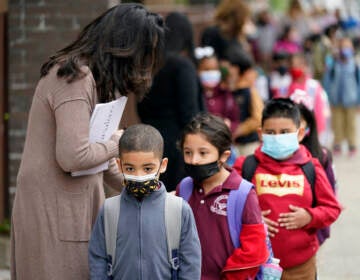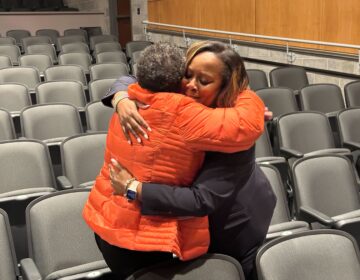N.J. Department of Education partners with Rowan to recruit more men of color as teachers
Studies suggest Black students perform better in school when they have at least one Black teacher.

Bobby Morgan is a math teacher at Joyce Kilmer Elementary School in Trenton, N.J. (Courtesy of Bobby Morgan)
Bobby Morgan still remembers it like it was yesterday.
He said his sixth-grade teacher told his parents he “did not belong” in honors classes. And those words stuck with him throughout high school and college.
He said he believed school wasn’t for him for most of his childhood.
Morgan, 37, was raised in Pemberton, New Jersey, and attended local public schools.
Most of his teachers were white, with the exception of two women of color in elementary school. He said it may have made a difference if he had Black men role models in education, especially because, outside of class, he dealt with issues that he had no control over.
According to Education Week, only 2 % of teachers in America are Black men, despite most of America’s students being youth of color (teaching is a woman-dominated profession).
New Jersey Department of Education data shows that children of color make up 59% of the state’s student body. However, teachers of color only make up 17% of the teacher workforce.
It ultimately inspired him to return home to become a math teacher before transferring to Joyce Kilmer Elementary School in Trenton.
He said it’s his “calling.”
“I never thought I belonged. And only through doing a lot of inner work and understanding who I am and understanding the history of resilience and genius in Black and Brown people was I able to combat that,” Morgan said. “And I want to do the same for every single student who comes to my classroom.”
New program aims to bridge the gap
This week, the New Jersey Department of Education announced a program in collaboration with Rowan University to recruit more men of color for teaching jobs, especially those from economically disadvantaged backgrounds.
The Men Of Color Achievers Program, or MOCHA, was first introduced in January 2018 through legislation sponsored by newly appointed Senate majority leader Sen. Teresa Ruiz (D-29) and majority whip Sen. Troy Singleton (D-7).
The Department of Education will fund a $475,000 grant that Rowan University is expected to use to “focus on recruiting, preparing, supporting and retaining males of color to earn certification through an alternate route program,” the university said on Wednesday.
Rowan University said the program would mainly target South and Central New Jersey schools.
Black educators discuss inequities in the school system
Sean Smith, another Black teacher at Joyce Kilmer Elementary School, said students in many urban school districts like his, where students of color tend to make up the majority, face unique challenges.
And there is research to back it up.
According to a 2019 Economic Policy Institute Report, Black and low-income children are more likely to experience adverse childhood experiences that lead to “disrupted physiological functioning” and “depressed academic achievement.”
Smith, 26, said negative childhood experiences can lead to students getting into fights or communication issues as a means of “survival.”
“It’s a job that’s very impactful, and it’s very difficult at the same time,” Smith said. “Because we don’t go home with a lot of our kids…you don’t know what happens when they go home.”
Some educators think New Jersey’s standards for achievement overlook the external factors that can hamper a student’s willingness to learn, Morgan said. He claimed that cultural bias and systemic inequities in the school system impact performance.
He pointed to policy and discriminatory practices that historically targeted communities of color, resulting in widespread poverty.
“The educational debt that we incur because of lack of funding, because of lack of resources, because of when you tie funding to property taxes, and then you historically marginalize a whole community by ‘white flight,’ and so many other things that leave them vulnerable,” Morgan said.
“A lot of the biases that people carry with them affect how you show up as an educator. And so when I’m in the classroom, my expectations for students remain high, even though I know what’s up against them,” Morgan added.
Morgan founded Liberation Lab, an educational consulting firm that focuses on diversity, equity, and inclusion.
But research also suggests that having a Black educator in one’s formative years can be critical for students’ development because Black teachers tend to have “higher expectations for Black students,’ according to Education Week.
Education Week found that “Black students, especially Black boys from low-income communities, are more likely to both graduate from high school and enroll in college when they have just one Black teacher in elementary school. And that Black students are “less likely to receive detentions, suspensions, or expulsions from Black teachers.”
Tackling the issues as a community
Andrew Binger, a former English teacher and Artistic Director for Yendor Theatre Company in Newark, has partnered with local organizations to host workshops tailored to BIPOC men who work in education — including a December 2021 event attended by Newark Mayor Ras Baraka.
“The goal was to figure out ways that we can provide space so that there can be a support system for Black male educators,” Binger said. “Because… the percentage of Black male educators in the country is abysmal.”
Binger, 31, said many men who attend his workshops have trouble navigating bias in administration and some are pigeonholed in “disciplinarian” roles instead of being assigned to the classroom.
The latter is a national trend, according to Education Week.
“There aren’t many safe spaces … that really understand the challenges and the nuances,” Binger said.
Rowan University said MOCHA is a two-year pilot program. The university said it plans to select 25 participants for the program each year, and said it would “collect data” to measure its success.
WHYY is your source for fact-based, in-depth journalism and information. As a nonprofit organization, we rely on financial support from readers like you. Please give today.







